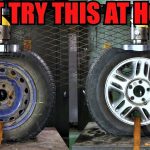Choosing tires for SUVs and sports cars requires knowledge of the different types available and the differences in their performance. Tires need to be able to handle a wide range of road conditions, and you should match conditions with the driving style. Choosing the right tire is important for your safety and the safety of other road users.
Whether driving an SUV or a Sports Car, you must keep your tyres in good condition to ensure maximum performance. You can follow some tyre tips to ensure you get the most from your vehicle.
Maintaining Your Tyres
Keeping your SUV and sports car tyres in good condition can greatly impact your overall performance. Taking care of your car’s tyres can ensure a smooth ride, improved handling and gas mileage.
When choosing tires for your vehicle, choose the size and type that are designed to be compatible with the car. Different types of vehicles require different sizes and strengths of tyres. For example, a sports car may have smaller tyres for better performance. Similarly, a large pickup truck may need bigger tires for strength.
You should also check your tires regularly for any signs of damage. Small punctures, cracking, and uneven wear can reduce the lifespan of your tyres. If you detect any problems, a professional should inspect the tyres.
If you drive often, you should check your tyres at least once a month, including the tyre pressure. You should check your tyres more often if you drive over potholes or debris.
Tyre Tips For SUV
Choosing the right tyres for your SUV or sports car is important. Getting the correct size can reduce fuel consumption and increase longevity. If you’re looking for new tires, visit Firestone Complete Auto Care for recommendations. In addition, you can find the vehicle’s recommended tire size on a sticker located on the driver-side door jamb.
While there is no secret formula, you can increase your chances of getting the right tires by checking your manufacturer’s recommended tire size, sticking to the vehicle’s recommended tire pressure, and having your tires aligned yearly. Having the tires aligned is important because uneven or damaged road surfaces can cause uneven wear. Having the tires rotated every other year is also a good idea; you’ll likely need a spare tire.
The all-season tire is your best bet if you live in a climate that isn’t too cold or hot. These are designed to handle light mud, gravel and mild snow.
Tyre Tips For Sport Cars
Keeping your tyres in tip-top shape will help keep you safe and secure on the road. In addition to keeping your car running like a well-oiled machine, you’ll also save on gas. One of the best ways to save on gas is to regularly check your tires’ air pressure. Having the right tire at the right pressure can save you a fortune in fuel. When it comes to the latest high-performance, fuel-efficient car models, it’s important to find out what your manufacturer recommends. Don’t hesitate to ask if you have questions about the tire’s air pressure.
It’s also a good idea to do a comparison shop before you buy, especially if you’re looking to swap your old tyres for shiny new ones. If you’re in the market for new tyres, consider buying a set of tires that meet your company’s standards and your budget. In the long run, buying cheap, low-quality tires can cost you thousands of dollars.
Tyres are categorized by their tread depth and speed rating. All-season tires are a good choice for SUVs and sports cars because they provide good traction on dry and wet roads. Some tires are also designed for specific conditions, such as off-roading or towing.
The load index is a measurement of the maximum load that a tire can support. For example, a 150-load index can carry up to 7,385 pounds. Excessive loads can adversely affect the handling and ride of a vehicle.







